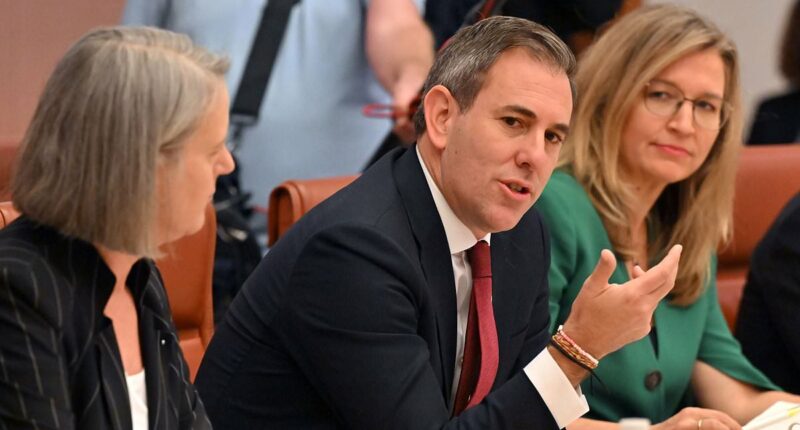Share this @internewscast.com
Back in the 17th century, French statesman Jean-Baptiste Colbert famously remarked that taxation involves ‘plucking the goose to obtain the largest possible amount of feathers with the smallest amount of hissing’.
Dead geese don’t hiss.
This straightforward principle is what guides inheritance taxes—often known as death taxes. Essentially, they are considered effective, difficult to avoid, and are required at a time when you’re no longer in need of the money.
For decades, Australians across the political spectrum have loathed the idea of inheritance tax.
But under certain conditions, it might not be so bad. Hear me out.
Who wouldn’t prefer taxes being applied after death rather than during life? The key is ensuring that introducing these death taxes leads to a reduction in the taxes we currently pay.
The challenge with politicians exploring ways to balance the budget is they often introduce new taxes without eliminating outdated or counterproductive ones.
If inheritance tax were to be implemented in Australia, don’t be fooled into thinking it will coincide with the removal of other taxes. What’s more likely is a familiar scenario: being taxed throughout life and then once more after passing.

For decades, Australians across the political spectrum have loathed the idea of inheritance tax (stock image of retired couple)

A significant transfer of wealth is set to occur from the baby boomer generation to their Millennial and Gen Z children in the coming decades. (Pictured: Schoolies in November 2024)
Australia once had death taxes, just as many countries around the world still do today. Then came the 1970s stampede. Joh Bjelke-Petersen scrapped Queensland’s death duties, other states panicked about a northbound retirement rush, and by the early 1980s, the whole country was death-duty-free.
Ever since, a new death tax has been the scare campaign that keeps on giving: a weapon used even when no party was even proposing it. The truth rarely gets in the way of a good scare campaign.
This week, the subject crawled out of the political crypt.
Jim Chalmers’ economic roundtable entertained a wide suite of ideas, and the old taboo got a mention: inheritance taxes, alongside a wealth levy and changes to capital gains.
The Treasurer didn’t adopt any of it. He convened a conversation without explicitly endorsing a new policy. But simply putting fairness and sustainability on the table was enough to unleash the usual chorus: a ‘tax on dying’, an ‘aspiration tax’, a raid on the family home.
The lines are familiar because they work.
Here’s the awkward truth, however. We rely heavily on wages and company profits for revenue while allowing large, unearned windfalls to pass untaxed between generations, exacerbating wealth inequality.
Most rich countries still have a version of death duties. If you care about basic equity, taxing very large bequests is the least distorting way to help repair the budget without belting work… as long as the move coincides with tax reductions elsewhere, such as on incomes – that’s the crucial bit.

Jim Chalmers’ economic roundtable entertained a wide suite of ideas, and the old taboo got a mention: inheritance taxes. The Treasurer (centre) didn’t adopt it
The design matters more than the slogan. A politically durable model should look like this:
Make it federal. We tried state-based death duties – it didn’t work. One premier abolished them, the rest soon followed. A national tax with the proceeds distributed to the states prevents another race to the bottom.
Aim high and narrow. Set a threshold that’s so generous that most estates never cop a bill. Exempt real, working farms and family firms with succession plans, and instead focus on dynasties hiding behind clever accountants. The target is entrenched privilege at the top, not middle Australia.
Close the gift door. If you only tax inheritances, wealthy people will dodge it by giving money away before they die – it’s an invitation for tax avoidance. The fix? Clear, enforceable rules on gifts above a substantial annual cap – and a look-back period tough enough to sting.
Keep it simple, stupid. One or two rates would be enough. Minimal exemptions. Don’t build a labyrinth of carve-outs to be gamed by cashed-up heirs who can afford slick lawyers. Straightforward rules reduce avoidance and increase legitimacy.
Show the value. Hypothecate the revenue to things voters can see and use – such as hospitals, aged care, disability services and schools. People just might tolerate a new tax when they can see what it buys.
Brace for the inevitable fear campaign. We’ll be told death taxes punish aspiration. It’s nonsense. They modestly tax unearned windfalls at the very top so we can ease pressure elsewhere. We’ll be told it’s ‘double taxation’. Well, by that logic, everything is: you pay GST on goods bought with post-tax income.
The real question is whether the tax distorts behaviour. Inheritance taxes, designed well with a high threshold, distort far less than ramping up taxes on pay packets. In fact they have the potential to bring income taxes down, so you have more money while you’re alive rather than after you’re dead.

‘Who wouldn’t rather pay taxes after you’re dead rather than when you’re alive? As long as introducing death taxes means reducing the taxes we all pay now,’ writes PVO
We should also be honest about who benefits from the status quo. Inheritances increasingly flow to people already well into middle age, usually better off than average. Untaxed, they entrench advantage. If you want a society where effort matters more than parentage – and remember, Australia is the country of the ‘fair go’ – you don’t just preach merit, you need to temper dynasties.
There are legitimate cautions when thinking about new death taxes. In a global economy, wealth can move. Set the threshold too low or the rules too fiddly and you encourage avoidance schemes and political backlash.
That’s why any reform must be modest, simple and well-targeted. Pair it with obvious protections for the family home up to a generous limit, clear treatment of super that doesn’t keep changing, and real relief for genuine small-business succession.
And, most importantly of all, the new law would need to be written in plain English, not a thousand-page invitation to creative accounting.
Australia has a structural deficit, an ageing population and long-term costs mounting in areas such as health. If Labor won’t broaden the GST, an inheritance tax above a high threshold is the cleanest of the imperfect options. The alternative is pretending bracket creep and debt will pay for everything without stifling productivity.
The Opposition has a choice here as well.
It can run a scare campaign and it’ll probably work – or it can be honest about trade-offs and argue over design specifics to make an inheritance tax work better and fairer.

A report published by the left-leaning Australia Institute ahead of the government’s economic roundtable recommended three ‘simple’ tax reforms to bolster the nation’s finances – including scrapping the 50 per cent capital gains tax discount on selling a property
Here’s the question I put to Aussies who immediately gawk at the idea of death taxes: Do we keep leaning on workers while untaxed fortunes glide across generations, or do we ask those inheriting very large windfalls to help fund the services we all use?
If that idea is political suicide, what does that say about the state of our politics?
Colbert’s goose still needs plucking. The trick is to take a few feathers from only the fattest birds. If Canberra wants to prove it can do more than convene conversations, it knows where to start.
That said, the problem with this government is they want to find ways to tax more without reforming the wider tax system. New death duties need to happen as part of a wider shake-up, not in isolation.
















